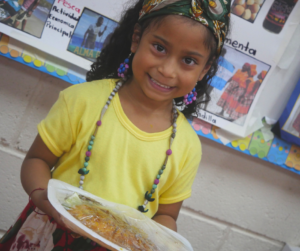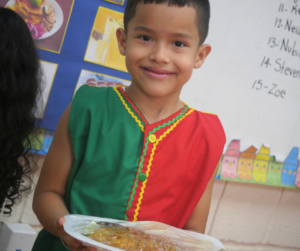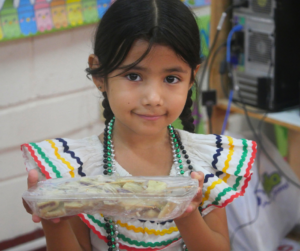02
Jul '24

Sharing our indigenous culture!
02
Jul '24

Did you know that Honduras is a country with an incredibly diverse cultural heritage? In honor of the beginning of Indigenous Peoples’ Month, we’re taking you on a fascinating journey through the ethnic groups of Honduras. Get ready to learn about their colorful costumes, delicious foods, and unique traditions that preschool children have been enthusiastically celebrating.
The Ethnic Groups of Honduras: A Cultural Treasure
Honduras is home to nine ethnic groups, each with its own history, customs, and way of life. Here are some of the main ones:
1. The Garífunas
Originating from the Atlantic coast, the Garífunas are known for their vibrant music and dances, such as Punta. They are Afro-Caribbean heritage and their typical attire includes colorful skirts and embroidered shirts. In Garífuna cuisine, there are many delicious dishes, with the most famous being “sopa de caracol”.
Originating from the Atlantic coast, the Garífunas are known for their vibrant music and dances, such as Punta. They are Afro-Caribbean heritage and their typical attire includes colorful skirts and embroidered shirts. In Garífuna cuisine, there are many delicious dishes, with the most famous being “sopa de caracol”.


2. The Miskitos
Located in the region of La Mosquitia, the Miskitos have a very close relationship with nature. Their traditional costumes are made from natural fibers, and their cuisine includes dishes like Kasabe, a type of yuca tortilla commonly eaten with a stew of meat and plantain.
Located in the region of La Mosquitia, the Miskitos have a very close relationship with nature. Their traditional costumes are made from natural fibers, and their cuisine includes dishes like Kasabe, a type of yuca tortilla commonly eaten with a stew of meat and plantain.


3. The Lencas
The Lencas, the largest indigenous group in Honduras, are found in the mountains of the western part of the country. Their clothing is colorful and adorned with geometric patterns. Among their typical dishes are montucas, which are sweet corn dough wrapped in leaves and filled with chicken or pork.
The Lencas, the largest indigenous group in Honduras, are found in the mountains of the western part of the country. Their clothing is colorful and adorned with geometric patterns. Among their typical dishes are montucas, which are sweet corn dough wrapped in leaves and filled with chicken or pork.


4. The Tolupanes
Living in the mountains of central Honduras, the Tolupanes keep their ancestral traditions alive. Their attire includes long, colorful tunics, and their diet is based on corn, beans and rice.
Living in the mountains of central Honduras, the Tolupanes keep their ancestral traditions alive. Their attire includes long, colorful tunics, and their diet is based on corn, beans and rice.


5. The Mayas
The Mayas are renowned for their advanced ancient civilization, known for impressive ruins like Copán, their sophisticated understanding of astronomy, and significant contributions to mathematics. But the Mayan culture is not just a relic of the past; it is a living, vibrant tradition carried on by their descendants.
Today, the Mayas continue to honor their rich heritage through traditional practices, languages, and crafts. They preserve their ancestral knowledge and celebrate their identity with colorful festivals, intricate weaving, and traditional ceremonies.


Throughout the month, preschool children have been showing their classmates what the ethnic groups of Honduras are like. They have shared delicious traditional foods such as baleadas (thick tortillas filled with beans and cheese), tamalitos (small corn cakes), pineapple drinks, coconut candies, fried fish, and plantains. With their traditional costumes and tasty dishes, they have transformed the classroom into a cultural feast.


Honduras is a country full of diversity and cultural richness. By celebrating Honduras’ Indigenous Peoples’ Month, we not only honor these ethnic groups but also learn to appreciate the variety and beauty of our roots. We hope this journey has inspired you to learn more about Honduras and to pray for the global church that His Kingdom would grow in every tribe, language, ethnic group across Honduras and the world.

